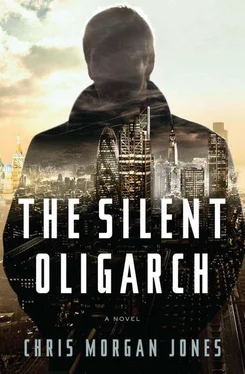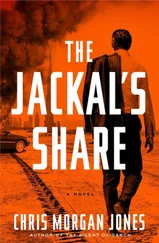“I will do my front.” Oksana turned herself over with great economy of movement and closed her eyes. Lock picked up his phone, one of three lying by his side, called the hotel, and spoke to the concierge. Then he sat back and drank, watching a Jet Ski whine its way across the bay.
Softly, abruptly, one of his other phones started to vibrate. He looked down at it and recognized the number, a French mobile. He let it buzz away helplessly for a second, closed his eyes briefly in resignation and picked it up.
“Hello,” he said, in Russian. Allo. It sounded strange on the beach, in the sun.
“Hello, Richard.” That hoarse, low voice. “I need you here this evening. Please come now.”
“Of course.” He hung up, and sighed. He wasn’t ready to return to that world.
“Sweetheart?” Lock never knew whether to call her “sweetheart” or “darling.” He had called his wife both, over time, but neither seemed right for Oksana who, knowing what he was going to say, didn’t respond. “I have to go for a few hours. I’m sorry.”
“How long?”
“I can never tell. I’ll call when I know.”
He gathered up his phones and his wallet, stood up, and bent down toward her. She turned her head away, the smallest fraction, and he kissed her on the side of her mouth. “Have what you like. I’ll pay the bill.” He straightened stiffly, pulled his white linen shirt off the back of his lounger and left.
HE COULD HAVE TAKEN the helicopter to Nice and then a taxi from there—residents of Monaco loved to do this—but he was wary of helicopters. He had never liked them. Planes were fine: planes had wings and resembled birds a little, and birds could fly and land. Planes had a precedent. But nothing in nature was like a helicopter, unless it was a sycamore’s winged seed as it slowly, inevitably, dropped to the ground. There was another reason that he avoided them, more superstitious or more practical he couldn’t say: his kind seemed to die in helicopter accidents much more often than they should.
So now he was in the backseat of a Mercedes, showered and wearing a tan linen suit, on the fast, sinuous road between Monaco and Nice, traveling through tunnels and between mountains at great speed. He could feel his worries returning. Malin wouldn’t have summoned him for something trivial. Lock had spent his working life preparing for the police to come, but the thought of them had always terrified him and terrified him still. His job was to lie, but he did his lying in seclusion, like a writer, not face-to-face like a salesman. Over the last fifteen years he had wrought an intricate fiction with closed-ended funds and open-ended funds, with limited liability companies and limited liability partnerships, with sociétés anonymes and sociétés anonymes à responsabilité limitée, with Liechtenstein anstalts and Swiss stiftungs and Austrian privatstiftungs, with every imaginable acronym in every available offshore hideaway. He was proud of his work, if not wholly sure of it. On the wall of his office in Moscow hung a huge white board that showed the ever-changing structure of the network, as he called it. It looked like a technical drawing, unknowably arcane: hubs and spokes and clusters covered the board, changing and proliferating as Malin’s operations multiplied. Lock knew it all. He knew each company, each bank account, each company director; he knew the filing requirements territory by territory; he knew when money had to leave one place and be due in another. He also knew that it was well built; it was as solid as it could be. But to justify it to someone, to defend it as fact—that he wasn’t sure he would be able to do.
He checked himself. Perhaps this had nothing to do with an investigation. Maybe this was Moscow politics: a tacit edict from the Kremlin, a play for one of Malin’s assets by some rival faction. But then, nothing happened in Russia in August. Maybe it was something as benign as a new acquisition, or a request for cash to be freed up from one part of the organization to fund a transaction in another. Maybe Malin was simply lonely. Lock smiled and looked out of the window at the grand sweep of the Côte d’Azur, majestic, hot, overpopulated. Whatever the news was, he would have to seem equal to it.
Past Nice the traffic slowed to a stop. So many Netherlands plates, Lock noticed—did the Dutch never fly?
At Antibes the road cleared a little and they were soon at Cannes, where the car turned south toward Théoule-sur-Mer. Red-brown peaks rose up above the coast road, rough and primitive. Malin, who always seemed to know what was under his feet, had once told him that the Esterel mountains owed their color to porphyry, a stone loved by the Romans and the Greeks. How ancient they looked, severe, adamantly resisting civilization, at odds with the tidy villas that lined the road.
By the time they reached Malin’s compound, they had left Théoule behind and the villas had almost run out. Malin had his own Cap, a small headland bounded on the north by an eight-foot wall that separated it entirely from the mainland. He had taken this house because it was easy to secure: on the remaining three sides terraced gardens ended in red cliffs that dropped sheerly to the sea. To these natural defenses he had added guards (Russians, not locals, armed) who patrolled the perimeter day and night. On the western side of the Cap a steep path led down to a small sand beach. When the house had been built, in the 1920s, yachts had no doubt been moored in the small bay and guests would have sailed around from Cannes and La Napoule for dinner. Now two guards were permanently stationed there and guests of any kind were rare.
The car slowed to a stop by a low gatehouse. Lock lowered his window and showed his face; the gates opened.
Another Mercedes was parked in the driveway, its driver asleep in his seat. Lock didn’t recognize it. He thanked his own driver, told him in poor French that he might be an hour or more, and walked past the two guards at the front door.
EACH TIME HE CAME HERE he was struck by the unnecessary elegance of the house. It was of modest size by the standards of the Riviera, low and white, touched here and there with a trace of art deco, and gave the general impression of being ready to set sail at any moment into the sea that it commanded. The back of the house was shaded by live oaks and pines; the front gave out onto simple lawned terraces progressing in steps to the edges of the cliffs, which were fringed with trees; downstairs every room opened through huge French doors onto the garden, where a fountain softly played. Light flowed through the place, but even in high summer it was cool inside. Fifty yards away there was a small chapel, redundant now, that Lock had always felt he should visit but never had.
The dining room was where meetings were held. Malin was sitting at the dining table, leaning back in his chair, his thick arms folded across his chest. He wore a white shirt with short sleeves and a splayed collar, and against the white his skin was sallow. He was big, solid, like a Russian wrestler in retirement. Impermeable, thought Lock: nothing got through, in either direction. His broad face was fleshy and on another man, with its jowls and its baldness and its double chin, could have been jovial, but his eyes overwhelmed the rest. They were dark brown and heavy, neither curious nor passive. Malin never seemed to blink, but nor did he stare. The eyes simply were. Lock still felt uneasy whenever he looked into them. As now.
“Good evening, Richard. I am sorry to interrupt your vacation.” Malin spoke in English with a heavy accent, his voice low and resonant. Lock simply nodded, aware from experience that these would be the only pleasantries. “Phones, please.” Lock took his three phones from various pockets, removed the back and the battery from each, and put the components on a dresser standing against the wall where two other phones lay, also in pieces.
Читать дальше












